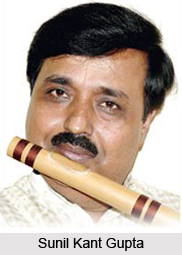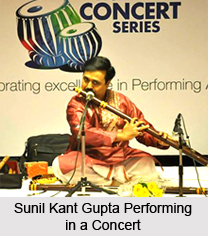 Sunil Kant Gupta was born in Lucknow, Uttar Pradesh. Being hailing from a family with a keen interest in music, Sunil Kant Gupta was motivated by his father Shri Ram Chandra Gupta to take up some form of musical expression.
Sunil Kant Gupta was born in Lucknow, Uttar Pradesh. Being hailing from a family with a keen interest in music, Sunil Kant Gupta was motivated by his father Shri Ram Chandra Gupta to take up some form of musical expression.
Early Life of Sunil Kant Gupta
He received his initial training under the watchful tutelage of Pandit Subhash Roy, a senior disciple of Pandit Bhola Nath. Simultaneously, Sunil Kant Gupta received guidance regarding the concept of ragas from Sarod Maestro Thakur Shamsher Singh and Pandit Dau ji Goswami. He also obtained "Sangeet Nipun" from Bhatkhande Sangeet Mahavidyalaya, Lucknow, under the able guidance of Professor Gopal Chandra Nandi, Late Prof. Prem Singh Kinot, Pandit Ganesh Prasad Mishra and Dr. Kamla Shrivastava. Along with his musical studies, young Sunil graduated from the Lucknow University.
Sunil received valuable guidance from flute maestro Pandit Raghunath Seth for several years, a disciple of legendary and incomparable Pandit Pannalal Ghosh. Sunil also learnt the flute from Sangeetacharya Late Dr. S.C.R. Bhat in Mumbai for almost 17 years since 1991. At present he is undergoing advanced training under Pandit Ajoy Chakrabarty.
 Performances of Sunil Kant Gupta
Performances of Sunil Kant Gupta
Presently Sunil Kant Gupta ranks as an "A" Grade artist on Akashvani and Doordarshan. He has participated in various music conferences all over India. He has also participated in the "Festival of India" at Russia in 1996 with his Guru Pandit Raghunath Seth. In India he has performed in prestigious concerts like Bhatkhande Jayanti, Lucknow; Sharad Utsav, Jaipur; twice at ITC Sangeet Sammelan, Kolkata; Swami Haridas Sangeet Samaroh, Mumbai; Sur Sagar, Bengaluru; Horizon for ICCR Lucknow and Pandit Kumar Gandharva Amrit Mahotsav, Devas. As a crown to all these programmes Sunil had an opportunity to represent India for the Indo-British Programme (Common Wealth in India 50 Years celebration.) in a jugalbandi with British flautist Brain Finnegan, in 1999 at the NCPA Mumbai. All India Radio featured Sunil in the National Programme of music several times. In the year 2008 Akashvani engaged Sunil for prestigious Akashvani Sangeet Sammelan-2008 for Shimla Station of Akashvani.
With his innovative talent, Sunil has made an extra large flute, which has enabled him to elaborate a Raga in the lower octave (Mandra Saptak) with great ease, as obtained in vocal music. He also made a folding flute in bamboo that is more convenient to carry while travelling. Regarding his performance, it has to be noted that he gives due weightage to both to the "Gayaki" and "Gat-kari" in his rendering.
Achievements of Sunil Kant Gupta
Sunil Kant Gupta had received a number of awards in various occasions. He was awarded the "Surmani" title by Sur Singar Samsad Mumbai in 1989. Sunil Kant Gupta is the recipient of Grammy Award certificate as a participant for the award winning Concert for George performed at Royal Albert Hall, London in 2002 under Bharat Ratna Pt. Ravi Shankar.
He is a First Prize winner at the U.P.Sangeet Natak Academy in 1981and also bagged First Prize at Akashvani (A.I.R.) competition in 1982.




















